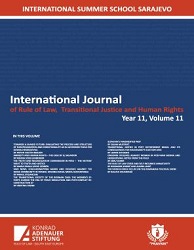Transitional Justice in Post-dictatorship Brazil and its Consequences for Bolsonaro’s Election 2018
Transitional Justice in Post-dictatorship Brazil and its Consequences for Bolsonaro’s Election 2018
Author(s): Leonie SchiedekSubject(s): Human Rights and Humanitarian Law, Law and Transitional Justice, Political history, Government/Political systems, Politics and law, Post-War period (1950 - 1989), Sociology of Politics
Published by: Udruženje “Pravnik”
Keywords: Post-dictatorship Brasil; transitional justice; 2018 national elections; authoritarian military regime; Human Rights violations; election of Jair Bolsonaro; democracy;
Summary/Abstract: In the national elections 2018 in Brazil, a right-wing populist and open advocate of the authoritarian military regime that ruled Brazil from 1964 until 1985 Jair Messias Bolsonaro took office. Since the end of the military dictatorship different transitional justice measures were applied in order to compensate past Human Rights violations. However, the perpetrators have never been sentenced and justice has never been restored. In this paper, it is highlighted how the dominant public narrative of the military dictatorship favoured the election of Jair Bolsonaro as reaction to a multiple national crises. The results show that transitional justice efforts in postdictatorship Brazil have failed on all levels to re-establish truth, justice and the rule of law. The positive narrative of the military law-and-order dictatorship has pushed the Brazilian voters in the direction of a right-wing politician during several tremendous crises. Bolsonaro’s success can therefore be explained by the fertile ground for populist ideas prepared by a fragmented society with roots in the dealings of the past. Further development of the Human Rights and democracy situation in Brazil needs to be observed.
Journal: International Journal on Rule of Law, Transitional Justice and Human Rights
- Issue Year: 11/2020
- Issue No: 11
- Page Range: 93-107
- Page Count: 15
- Language: English

